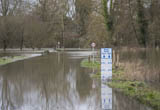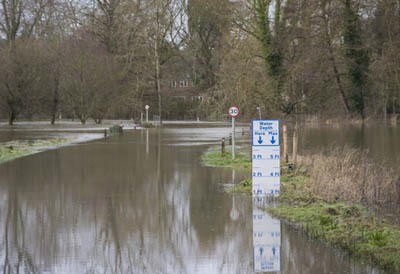Flooding: The lessons learned
Peter Kendall says the flooding crisis presents a golden opportunity to re-evaluate farming's position in politics and we present a timeline of the flooding since before Christmas


Exquisite houses, the beauty of Nature, and how to get the most from your life, straight to your inbox.
You are now subscribed
Your newsletter sign-up was successful
Our current flooding crisis should act as a very loud alarm bell. As farmers and country dwellers, we are more aware than our urban cousins of our interdependency with Mother Nature, but recent weeks have brought into sharp focus how vulnerable we all are to extreme weather events.
Those battling stoically to save their livestock on the Somerset Levels and along the banks of the Severn and Thames have received fantastic support from fellow farmers and the public at large. But, as farmers, we accept that, at this time of national emergency, we must put the risk to human life first and that urban areas should come before farmland. However, the lessons learnt from this crisis will be many and it presents a golden opportunity for the farming industry to press for a rebalancing of official attitudes that have become dismissive of its importance.

* Subscribe to Country Life and save
As we experience the worst floods in living memory, California is in the middle of a drought. In the Midwest, temperatures have fallen to -50°C and there is concern for the wheat crop in both America and the Ukraine. Australia has experienced record-breaking high temperatures-a friend emailed me with tales of farmers destroying stock due to lack of feed and water and abattoirs being overbooked for months.
Extreme weather events around the world, combined with the rapidly growing population, make food security a massive challenge for the 21st century. Food production needs a proactive agenda, not the indifference we have seen for far too long. Defra Secretary Owen Paterson and his Farming Minister George Eustice are knowledgeable countrymen, but they face a challenge in getting other Government departments to wake up to farming's importance.
The floods on the Somerset Levels are, of course, down to unprecedented rainfall levels, but, as I stood by the River Parrett recently, I saw the reeds encroaching into that vital waterway, slowing the flow and contributing significantly to the thousands of acres under water. When New Labour appointed Baroness Young, former chief executive of the RSPB, to head up the Environment Agency (EA) in 2000, it became a ‘campaigning regulator'. During the flooding of 2007, Baroness Young faced cross-party flak for not implementing flood-risk action plans. She was also reported as saying she would like to blow up all the pumps on the Somerset Levels and, at a stroke, undo the drainage work undertaken by medieval monks.
Last autumn, a cycling trip to Holland with my children revealed a different story. There, watercourses are well-maintained, trimmed and dredged. Farmers know that we can drain land; the Dutch taught us how to drain the Fens 300 years ago and those systems are still effective. They also know that, in recent times, budgets have been cut and the Treasury has imposed crazy rules that allow grand capital projects, but, at the same time, as EA chief Lord Smith rightly points out, it has limited to £400,000 the money for dredging and maintaining the Levels. Farmers also believe that birds have been put before people.
Exquisite houses, the beauty of Nature, and how to get the most from your life, straight to your inbox.
Achieving a balance between productive farming and the environment has been central to my time at the NFU and will dominate the agenda for my successors. The environment is everything to farmers: the quality of our soil and a plentiful supply of clean water-at the right time and in the right place-are the foundation stones of production. Bird numbers are an important indicator of the health of the countryside, but the lobby groups who attack modern farming should not be judge and jury on ‘cause and effect'.
Badgers are in the firing line for increasing the spread of bovine TB, but they also destroy bees' nests and are a major factor in the dramatic declines of hedgehogs and ground-nesting birds. There are also the endless urban sprawl, the explosion in cars and the dramatic increase in domestic cats.
Mankind does impact on wildlife- either knowingly, through development, or unwittingly, by cherry-picking species to protect. I have always been clear that we farmers must do our utmost to produce food in a way that impacts as little as possible on the environment. But the UK population is due to reach 70 million by 2027 (it's 63 million now), at which point, if we go on as we are, we will not be much more than 50% self-sufficient in all foods. What we mustn't do is pile all the ill effects of modern living onto the backs of farmers. If, in 2050, our environment is in the same state as it is today, we will have done very well. If we're still producing the same amount of food as we are now, we will have a crisis.
The good news is that the farming industry is up for this challenge. Young people are returning to a more upbeat, self-confident industry and universities and colleges have waiting lists for agricultural courses. It's a great career choice again. However, I hope that the lessons learnt from the current flooding crisis will mean that future governments will help, not hinder, these new entrants to farming.
Flood timeline by Kate Green December 5, 2013 Storms hit Scotland and a tidal surge on the east coast causes houses to fall into the sea in Norfolk
December 18 More damaging storms batter Britain
December 23 Violent storms destroy power in the South; Dover port is closed, Gatwick airport flooded and Christmas travel is in chaos
December 24 The A303, a West Country artery, is closed due to the flooding
December 26-31 More bad weather; the Severn, Thames and Somerset Levels flood
January 4, 2014 Waves batter Aberystwyth, West Wales
January 7 A 27ft wave is recorded at Land's End, Cornwall
January 8 The Cherwell bursts its banks in Oxford and the rail line to Paddington is flooded
January 25 By now, Muchelney on the Somerset Levels has been cut off for three weeks; the Environment Agency (EA) has a record 62 pumps deployed on the Levels
January 26 Environment Secretary Owen Paterson meets drainage experts in Somerset
January 27 Mr Paterson is heckled by locals bearing placards saying ‘Please dredge our rivers' and the blame game starts, with Bridgewater MP Ian Liddell-Granger calling the EA's reasons for not dredging ‘pathetic'
January 31 7in of rain has fallen over 23 days this month, 51% above average
February 2 The Army is deployed on the Somerset Levels; a poster quips that the Navy would have been better
February 3 The South West Ambulance Service leaves an emergency defibrillator at Muchelney and appeals to the public not to be ‘flood tourists'
February 4 Prince Charles visits the Levels and pledges £50,000 from his Countryside Fund to Farm Help
February 5 The railway line at Dawlish, Devon, is destroyed by waves and 10 boats at Porthleven harbour, Cornwall, are sunk, further beleaguering the fishing industry
February 6 Mr Paterson is out of action with a detached retina; politicians fall over themselves to inspect rising waters
February 7 Villagers in Waltham St Lawrence, Berkshire, call for water to be pumped away from sewers
February 8 Dutch flood expert Jerome Van Heck arranges for a convoy of drainage equipment to arrive in Somerset from the Netherlands
February 10 The EA issues 14 severe-flood warnings along the Thames; flooding becomes an urban problem as some 1,000 homes are evacuated
February 12 Winds of 100mph cause havoc on train lines and a blizzard of sea foam falls on the Welsh coast. Defra announces that flooded households and businesses will receive a £5,000 repairs grant, companies will receive 100% business- rate relief for three months and a £10 million fund is set up for farmers
February 13 Two tractors pulling 15 tons of hay, straw and silage given by Yorkshire farmers leave Wakefield for Bridgewater, Somerset, and EA workers try to prevent the pumping station there from becoming flooded
February 14 Princes William and Harry help the Household Cavalry with flood relief in Datchet, Berkshire, and The Queen sends supplies from royal farms to Somerset
February 14-16 80mph gales hit the South Coast and 4in-February's usual allotment-of rain falls. Power cuts increase, planes are diverted, villages on the Severn are cut off and Lord Smith admits he ‘could have done better'.
* Subscribe to Country Life and save
* Follow Country Life magazine on Twitter
Country Life is unlike any other magazine: the only glossy weekly on the newsstand and the only magazine that has been guest-edited by His Majesty The King not once, but twice. It is a celebration of modern rural life and all its diverse joys and pleasures — that was first published in Queen Victoria's Diamond Jubilee year. Our eclectic mixture of witty and informative content — from the most up-to-date property news and commentary and a coveted glimpse inside some of the UK's best houses and gardens, to gardening, the arts and interior design, written by experts in their field — still cannot be found in print or online, anywhere else.
